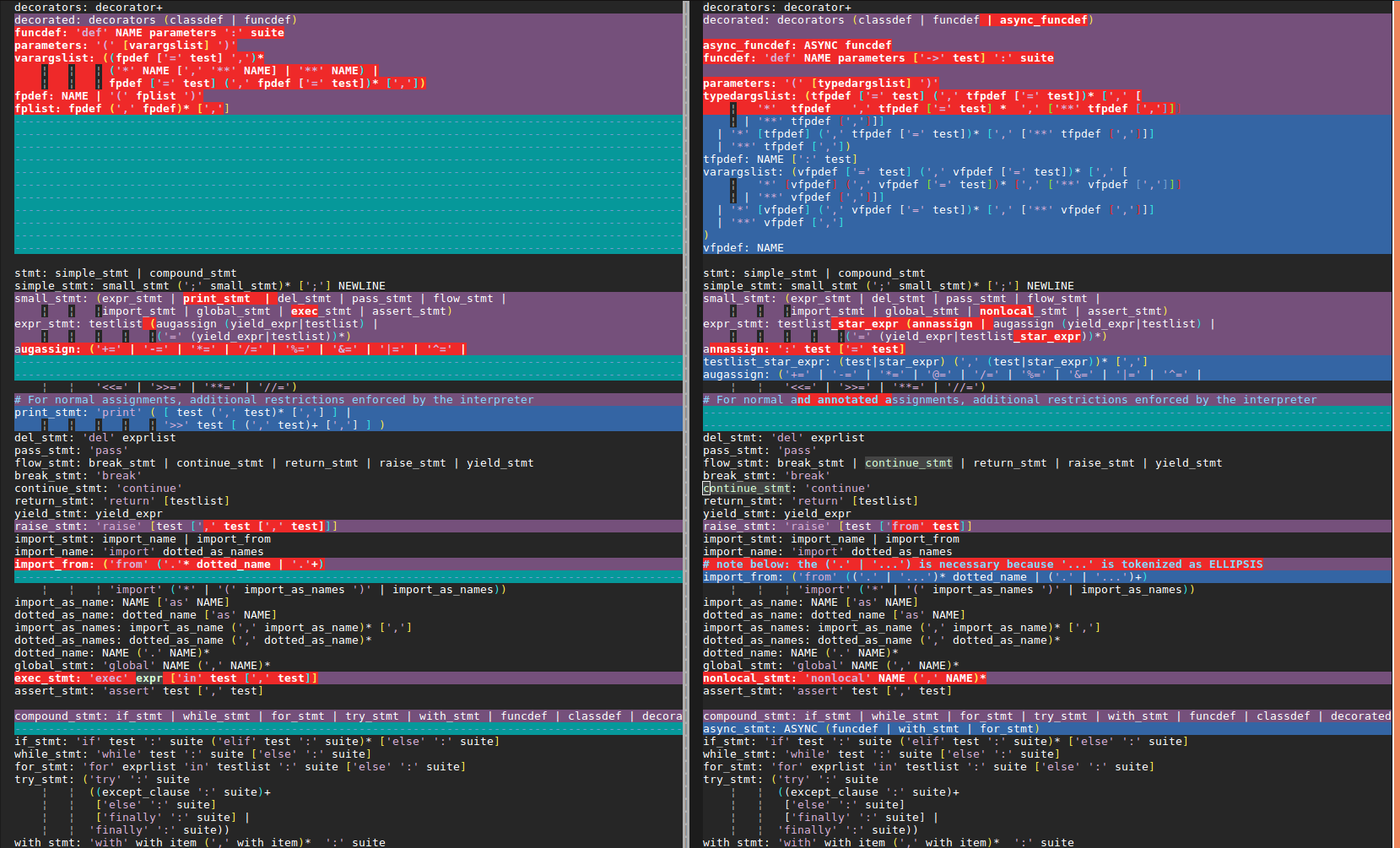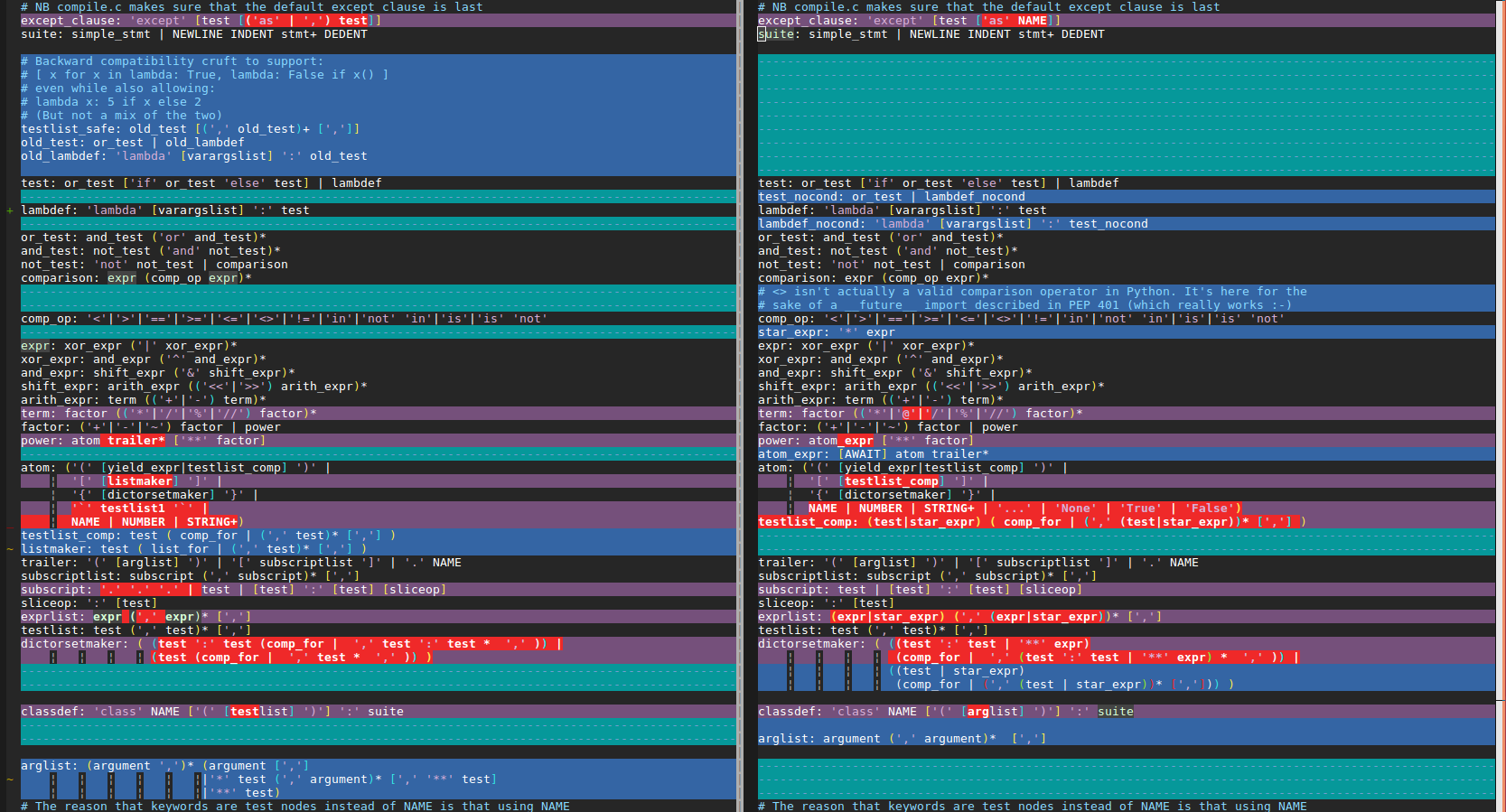Grammar reference¶
This page is here to serve as a reference for the grammar implementation. Baron
started as a python2.7 grammar implementation following the official
specification for that and
supporting both print statement and print function.
The evolution path regarding python3* is the adopt the same strategy that lib2to3 and try to support a combination of both grammar as much as possible.
This page describe the decisions taken regarding this dual support and it’s progress. Hopefully there will be very few conflicting situations.
Current goal is python 3.6 specification.
Python 2 and python 3.6 grammar differences¶
As a reference and an overview, here is screenshot of vimdiff showing the difference between python 2.7 and python 3.6 grammar differences.



List of differences¶
Some of the diff have been edited to isolate the focused difference of the section
Python 3.3 is the based grammar I’ve started diffing with, some of the grammar differences marked as 3.3 are actually from older python version.
Current status¶
Grammar diff has been done up to python 3.6.2.
Still, some stuff for the lexer are probably missing in this list like:
- fstrings
- adding _ in numbers
I need to got through all release notes to see that.
Done¶
Print function¶
Python 3.3 or earlier

Already done since the start.
This is handle at the parser initialisation level, is activate or not the print_function rule.
Ellipsis as atom (to replace ‘pass’)¶
Python 3.3 or earlier RedBaron: probably nothing to do (to be confirmed)
Baron: https://github.com/PyCQA/baron/pull/121
ADD '...' in atom rule
Matrix operator¶
Python 3.5
Baron: https://github.com/PyCQA/baron/pull/117 RedBaron: probably nothing to do (to be confirmed)
ADD '@' and '@=' to the lexer
ADD '@=' in augassign
ADD '@' in term
augassign: ('+=' | '-=' | '*=' | '@=' | '/=' | '%=' | '&=' | '|=' | '^=' |
'<<=' | '>>=' | '**=' | '//=')
term: factor (('*'|'@'|'/'|'%'|'//') factor)*
f-strings¶
Python 3.6
Baron: https://github.com/PyCQA/baron/pull/110 RedBaron: TODO
add f'' rf'' fr'' to the lexer
Underscore in numeric literals¶
Python 3.6
Baron: https://github.com/PyCQA/baron/pull/111 RedBaron: probably nothing to do (to be confirmed)
modify lexer to handle this
Nonlocal statement¶
Python 3.3 or earlier
Baron: https://github.com/PyCQA/baron/pull/112 RedBaron: TODO

Action:
ADD 'nonlocal' to lexer
ADD 'nonlocal_stmt' to 'small_stmt'
ADD new rule:
nonlocal_stmt: 'nonlocal' NAME (',' NAME)*
Kwargs only arguments¶
Python 3.0
PEP: https://www.python.org/dev/peps/pep-3102/ Baron: https://github.com/PyCQA/baron/pull/108 RedBaron: TODO
Action:
ADD new rule:
parameter : STAR
Yield From¶
Python 3.3 or earlier
PEP 380 Baron: https://github.com/PyCQA/baron/pull/113 and some after work (spliting in 2 nodes, fixing testlist → test, …) RedBaron: TODO

Action:
ADD new node yield_from
Implement grammar from the screenshot
Await atom¶
Python 3.5
PEP 492 Baron: https://github.com/PyCQA/baron/pull/114 RedBaron: TODO
Before:
power: atom trailer* ['**' factor]
After:
power: atom_expr ['**' factor]
atom_expr: [AWAIT] atom trailer*
await is a NAME here, not a keyword (because you can do await = 42.)
Async Funcdef¶
Python 3.5 PEP 492 Baron: https://github.com/PyCQA/baron/pull/114 RedBaron: TODO
Before:
decorated: decorators (classdef | funcdef)
After:
decorated: decorators (classdef | funcdef | async_funcdef)
async_funcdef: ASYNC funcdef
async is a NAME here, not a keyword (because you can do async = 42.)
async for loop¶
Python 3.6
Before:
Baron: https://github.com/PyCQA/baron/pull/114 RedBaron: TODO
comp_for: 'for' exprlist 'in' or_test [comp_iter]
After:
async: NAME [SPACE] # where NAME == "async"
async_stmt: async for_stmt
async is a NAME here, not a keyword (because you can do async = 42.)
async with¶
Python 3.6
Before:
Baron: https://github.com/PyCQA/baron/pull/114 RedBaron: TODO
with_stmt: 'with' with_item (',' with_item)* ':' suite
After:
async: NAME [SPACE] # where NAME == "async"
async_stmt: async with_stmt
async is a NAME here, not a keyword (because you can do async = 42.)
Function return type¶
Python 3.3 or earlier

Action:
ADD '->' to the lexer
ADD ['->' test] to funcdef rule
funcdef: 'def' NAME parameters ['->' test] ':' suite
Exec function¶
Python 3.3 or earlier

Like print_function but for ‘exec’.
No one seems to be using that.
Typed arguments¶
Python 3.3 or earlier
Baron: https://github.com/PyCQA/baron/pull/140 RedBaron: Done

Action:
# parameters
# this is mixed with the removal of def a((b, c)): style
# which will probably need to continue supporting
CHANGE parameters: '(' [varargslist] ')'
^
TO parameters: '(' [typedargslist] ')'
^
# CHANGE
varargslist:
(
(fpdef ['=' test] ',')*
(
'*' NAME [',' '**' NAME]
|
'**' NAME
)
|
fpdef ['=' test]
(',' fpdef ['=' test])*
[',']
)
fpdef: NAME | '(' fplist ')'
fplist: fpdef (',' fpdef)* [',']
# TO
typedargslist:
(
tfpdef ['=' test]
(',' tfpdef ['=' test])*
[
','
[
'*' [tfpdef]
(',' tfpdef ['=' test])*
[',' ['**' tfpdef [',']]]
|
'**' tfpdef [',']
]
]
|
'*' [tfpdef]
(',' tfpdef ['=' test])*
[',' ['**' tfpdef [',']]]
|
'**' tfpdef [',']
)
# after some analysis, this is just a refactoring of the previous form with
# fpdef being changed to vfpdef
varargslist:
(
vfpdef ['=' test]
(',' vfpdef ['=' test])*
[
','
[
'*' [vfpdef]
(',' vfpdef ['=' test])*
[',' ['**' vfpdef [',']]]
|
'**' vfpdef [',']
]
]
|
'*' [vfpdef]
(',' vfpdef ['=' test])*
[',' ['**' vfpdef [',']]]
|
'**' vfpdef [',']
)
tfpdef: NAME [':' test]
vfpdef: NAME
Inheritance in class definition uses arglist now¶
Python 3.3 or earlier
I have no idea on why this is here but that’s easy to change.

Raise from¶
Python 3.3 or earlier

Action:
# 2.7
raise_stmt: 'raise' [test [',' test [',' test]]]
# 3.3
raise_stmt: 'raise' [test ['from' test]]
# merge
raise_stmt: 'raise' [test [(',' test [',' test]] | 'from' test)]
Variables annotations¶
Python 3.6
Before:
expr_stmt: testlist_star_expr (augassign (yield_expr|testlist) |
('=' (yield_expr|testlist_star_expr))*)
After:
expr_stmt: testlist_star_expr (annassign | augassign (yield_expr|testlist) |
('=' (yield_expr|testlist_star_expr))*)
annassign: ':' test ['=' test]
TODO¶
Remove old list comprehension syntax¶
Python 3.3 or earlier
I’m not sure on how to handle both situations (and it is needed? Old list comprehension syntax is like super edgy, I really wonder if anyonne has actually used that one that?)


False|True|None|… are now atoms in the grammar¶
Python 3.3 or earlier
Do I need to do anything about that?

Kwargs expressions¶
Python 3.5
Partially done with kwargs only arguments.
Before:
dictorsetmaker: ( (test ':' test (comp_for | (',' test ':' test)* [','])) |
(test (comp_for | (',' test)* [','])) )
arglist: (argument ',')* (argument [',']
|'*' test (',' argument)* [',' '**' test]
|'**' test)
# The reason that keywords are test nodes instead of NAME is that using NAME
# results in an ambiguity. ast.c makes sure it's a NAME.
argument: test [comp_for] | test '=' test
After:
dictorsetmaker: ( ((test ':' test | '**' expr)
(comp_for | (',' (test ':' test | '**' expr))* [','])) |
((test | star_expr)
(comp_for | (',' (test | star_expr))* [','])) )
# can be simplified apparently
arglist: argument (',' argument)* [',']
# The reason that keywords are test nodes instead of NAME is that using NAME
# results in an ambiguity. ast.c makes sure it's a NAME.
# "test '=' test" is really "keyword '=' test", but we have no such token.
# These need to be in a single rule to avoid grammar that is ambiguous
# to our LL(1) parser. Even though 'test' includes '*expr' in star_expr,
# we explicitly match '*' here, too, to give it proper precedence.
# Illegal combinations and orderings are blocked in ast.c:
# multiple (test comp_for) arguments are blocked; keyword unpackings
# that precede iterable unpackings are blocked; etc.
argument: ( test [comp_for] |
test '=' test |
'**' test |
'*' test )









